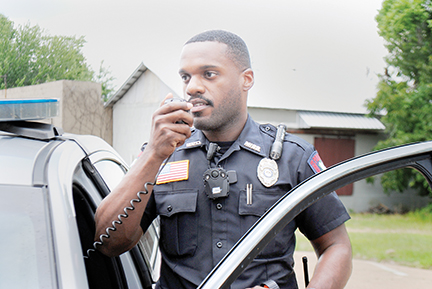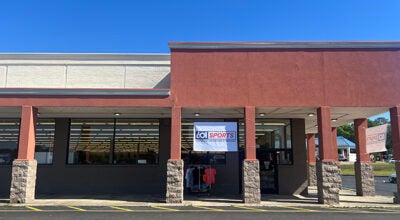Cameras are ‘insurance’ for cops
Published 8:58 pm Monday, May 8, 2017

- Photo by Aaron Paden/ Jonathan Buie II wears a body camera on his chest Monday during routine police business.
The two men seeking the police chief job in Brookhaven share a few commonalities.
Democrat Kenneth Collins and Republican Jason Gaskin have a law enforcement background. Both have ties to the Brookhaven Police Department. Collins serves there now as a lieutenant, while Gaskin is a former officer with BPD.
Both men have served in the Mississippi National Guard. Collins spent eight years with the 155th National Guard and was First Squad leader. Gaskin is still serving after 14 years in the Mississippi Army National Guard. He was also assigned to and served as customs and border protection agent for the 1-155th Infantry Battalion.
And they both believe that the practice of police officers wearing body cameras is a necessity.
Officers in the Brookhaven Police Department started wearing body cams in April last year. The department spend $13,000 for 35 cameras.
Police Chief Bobby Bell has said he considers the cameras to be a useful insurance for the department.
“I have said on many occasions, our department has been fortunate that we have not had a situation where an officer has been involved in a shooting or anything of that nature,” Bell said in June 2016. “But we do know that we are not exempt from it happening.
“We are looking at the cameras just like we do insurance. It’s better to have it and not need it than to need it and not have it.”
The idea behind the cameras is that they will protect officers and civilians alike.
The audio and video recordings serve as evidence in cases where officers are required to use force. When the cameras in Brookhaven were first announced, some concerns were raised about possible privacy violations, but Bell said at the time he had incorporated advice from the American Civil Liberties Union into the policy, along with the most recent best-practices from other departments.
According to the policy, officers must use the cameras any time they interact with the public in their official duties, but they should also announce that the recording is taking place.
Citizens may decline to be recorded in places where they have a reasonable expectation of privacy — except in the case of an arrest of search — and the policy lists restrooms, locker rooms and residences as examples.
According to the policy, officers should continue the recording until any interaction is completed. Any time an officer fails to activate the camera, record an entire contact or interrupts a recording, the officer must document a reason.
That document is kept on file and can be used as evidence in the case of a public complaint.
To ensure that the cameras are being used correctly, supervisors in the department will randomly review body-worn camera recordings.
Officers also receive training on the use of the cameras, and the recordings must be uploaded by the end of each officer’s shift. Footage is deleted after 90 days, and a long-term backup is only made if the data becomes evidence for an ongoing investigation.
Collins, 53, feels secure when he’s wearing a body cam because he knows that it will record his words and actions as well as the person he is interacting with.
“Any time you get out on a complaint, the camera is on,” he said.
Cameras are worn on the officers’ uniform in the center of their chests, next to their badges. They turn them on manually when they step out of the vehicle on a complaint call.
If they interact with the public on a complaint call and don’t turn it on, that officer must offer a written response with the reason.
Collins called the body cams the “wave of the future.” He said the footage has come in handy to see what really happened in a situation so the investigators aren’t relying on the officer’s word or the individual in question.
“Every officer should be equipped with a body camera,” he said. “That’s a must. That will keep us on a professional level. It’s their word against ours.”
He said people try to provoke officers and the body cams record that as well as the officers’ actions.
“People will make you lose your temper,” Collins said. “We run into people, they try to goad you into getting angry. Some people will try your last nerve. We always have to be vigilant and stay professional.”
That’s not always easy, he said.
“They’ll spit on you and say they didn’t. They’ll cuss you out,” he said. “If we’re doing something wrong, it will record that. Sometimes if we get angry, we might use profanity. We’re human, too.”
Collins said individuals can decline to be on camera in their residence, citing privacy issues, but if they allow it and the camera records illegal activity, the police officer, by law, must do his job.
“If you’re doing right you don’t have nothing to hide,” he said.
Gaskin, 38, said he will “absolutely continue to utilize” the cameras if elected.
“Police officers all over the country have been using body cameras for years, and Brookhaven should as well,” he said in an emailed statement to The Daily Leader.
“Body cameras serve a dual purpose by holding police officers and citizens accountable for their actions.
“They are equally important in protecting citizens from possible corruption and protecting officers from false allegations. The use of body cameras paints the clearest picture of an incident if used properly.”
Gaskin said that all Brookhaven police officers should be properly trained on when and how to use body cameras and have that training updated regularly.
“The Brookhaven policy currently omits any disciplinary actions for officers that fail to adhere to the rules and requirements for the use of body cameras,” he said.
Bell said officers can face suspension if caught not recording interactions with complainants with body cams.
Bell randomly checks officers’ camera footage each morning to make sure it coincides with the complaint calls, he said.
If an officer does not follow the policy, Bell can recommend the officer’s suspension to the Brookhaven Board of Aldermen. That has not happened, he said.
Gaskin said accountability is a key theme in his campaign. “…And officers must be held accountable and understand they will face possible disciplinary action if equipment is misused,” he said.
“Technology is a powerful and useful tool, but police officers must not overstep their boundaries in serving the citizens of Brookhaven.”
Gaskin said he will demand professionalism.
“Officers that serve under me will have the necessary training and operational know-how to appropriately use body cameras while at the same time protecting the privacy of those involved in any incident,” he said.





